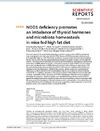Identificador persistente para citar o vincular este elemento:
https://accedacris.ulpgc.es/jspui/handle/10553/73992
| Título: | NOD1 deficiency promotes an imbalance of thyroid hormones and microbiota homeostasis in mice fed high fat diet | Autores/as: | González-Ramos, Silvia Paz-García, Marta Fernández-García, Victoria Portune, Kevin J. Acosta-Medina, Emilio F. Sanz, Yolanda Castrillo Viguera, Antonio Jesús Martín-Sanz, Paloma Obregon, Maria Jesus Boscá, Lisardo |
Clasificación UNESCO: | 32 Ciencias médicas | Fecha de publicación: | 2020 | Publicación seriada: | Scientific Reports | Resumen: | The contribution of the nucleotide-binding oligomerization domain protein NOD1 to obesity has been investigated in mice fed a high fat diet (HFD). Absence of NOD1 accelerates obesity as early as 2 weeks after feeding a HFD. The obesity was due to increases in abdominal and inguinal adipose tissues. Analysis of the resting energy expenditure showed an impaired function in NOD1-deficient animals, compatible with an alteration in thyroid hormone homeostasis. Interestingly, free thyroidal T4 increased in NOD1-deficient mice fed a HFD and the expression levels of UCP1 in brown adipose tissue were significantly lower in NOD1-deficient mice than in the wild type animals eating a HFD, thus contributing to the observed adiposity in NOD1-deficient mice. Feeding a HFD resulted in an alteration of the proinflammatory profile of these animals, with an increase in the infiltration of inflammatory cells in the liver and in the white adipose tissue, and an elevation of the circulating levels of TNF-α. In addition, alterations in the gut microbiota in NOD1-deficient mice correlate with increased vulnerability of their ecosystem to the HFD challenge and affect the immune-metabolic phenotype of obese mice. Together, the data are compatible with a protective function of NOD1 against low-grade inflammation and obesity under nutritional conditions enriched in saturated lipids. Moreover, one of the key players of this early obesity onset is a dysregulation in the metabolism and release of thyroid hormones leading to reduced energy expenditure, which represents a new role for these hormones in the metabolic actions controlled by NOD1. | URI: | https://accedacris.ulpgc.es/handle/10553/73992 | ISSN: | 2045-2322 | DOI: | 10.1038/s41598-020-69295-2 | Fuente: | Scientific Reports [EISSN 2045-2322], v. 10 (1), 12317, (Diciembre 2020) |
| Colección: | Artículos |
Citas SCOPUSTM
21
actualizado el 08-jun-2025
Citas de WEB OF SCIENCETM
Citations
18
actualizado el 18-ene-2026
Visitas
205
actualizado el 15-ene-2026
Descargas
134
actualizado el 15-ene-2026
Google ScholarTM
Verifica
Altmetric
Comparte
Exporta metadatos
Los elementos en ULPGC accedaCRIS están protegidos por derechos de autor con todos los derechos reservados, a menos que se indique lo contrario.
